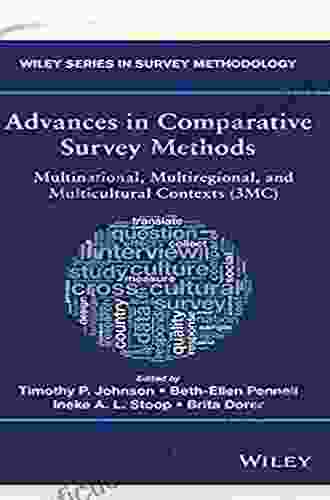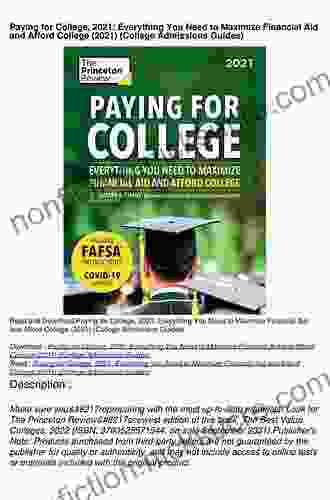Exploring Multinational, Multiregional, and Multicultural Contexts (3MC): A Comprehensive Guide

4.5 out of 5
| Language | : | English |
| File size | : | 27154 KB |
| Text-to-Speech | : | Enabled |
| Screen Reader | : | Supported |
| Enhanced typesetting | : | Enabled |
| Word Wise | : | Enabled |
| Print length | : | 1085 pages |
| Lending | : | Enabled |
In today's globalized world, researchers are increasingly conducting surveys in multinational, multiregional, and multicultural contexts (3MC). These contexts present unique challenges and considerations that researchers must be aware of in order to design and implement effective surveys. This article provides a comprehensive guide to 3MC surveys, covering the following topics:
* The challenges and considerations of conducting surveys in 3MC contexts * The importance of understanding cultural differences * Strategies for adapting survey instruments to different cultures * Techniques for addressing language barriers * Methods for reducing cognitive biases * Ethical considerations in 3MC surveys * Best practices for ensuring data accuracy
By understanding the complexities of 3MC contexts, researchers can design and implement surveys that capture accurate and meaningful data.
The Challenges and Considerations of Conducting Surveys in 3MC Contexts
There are a number of challenges and considerations that researchers must be aware of when conducting surveys in 3MC contexts. These include:
* Cultural differences: Different cultures have different values, beliefs, and customs. These differences can affect how people respond to surveys. For example, in some cultures, it is considered rude to express negative opinions, while in other cultures, it is considered more acceptable. * Language barriers: Language barriers can make it difficult for researchers to communicate with participants and to ensure that the survey instrument is understood. * Cognitive biases: Cognitive biases are systematic errors in thinking that can affect how people respond to surveys. These biases can be caused by a variety of factors, such as cultural differences, language barriers, and the way the survey is designed. * Ethical considerations: Researchers must consider the ethical implications of conducting surveys in 3MC contexts. These considerations include obtaining informed consent from participants, protecting their privacy, and ensuring that the survey does not cause harm.
The Importance of Understanding Cultural Differences
One of the most important challenges of conducting surveys in 3MC contexts is understanding cultural differences. Cultural differences can affect every aspect of the survey process, from the way the survey is designed to the way the data is interpreted.
For example, in some cultures, it is considered polite to agree with the interviewer, even if they do not actually agree with the question. This can lead to biased results if the researcher is not aware of this cultural norm.
It is important to research the cultural norms of the target population before designing and implementing a survey. This will help to ensure that the survey is culturally appropriate and that the data is accurate.
Strategies for Adapting Survey Instruments to Different Cultures
When adapting a survey instrument to a different culture, it is important to consider the following:
* The language of the survey: The survey should be translated into the native language of the target population. It is important to use a professional translator who is familiar with the cultural nuances of both languages. * The format of the survey: The format of the survey should be adapted to the cultural norms of the target population. For example, in some cultures, it is considered more polite to use indirect language, while in other cultures, it is considered more acceptable to be direct. * The content of the survey: The content of the survey should be adapted to the cultural context of the target population. For example, in some cultures, it is considered taboo to discuss certain topics, such as religion or politics.
Techniques for Addressing Language Barriers
Language barriers can be a major challenge in 3MC surveys. There are a number of techniques that researchers can use to address language barriers, including:
* Using professional translators: Professional translators can translate the survey instrument into the native language of the target population. It is important to use a translator who is familiar with the cultural nuances of both languages. * Using bilingual interviewers: Bilingual interviewers can administer the survey in the native language of the participants. This can help to reduce the risk of misunderstandings and to ensure that the participants understand the survey questions. * Using visual aids: Visual aids, such as charts and graphs, can help to overcome language barriers. By using visual aids, researchers can communicate complex concepts to participants who do not speak the same language.
Methods for Reducing Cognitive Biases
Cognitive biases can affect the accuracy of survey data. There are a number of methods that researchers can use to reduce cognitive biases, including:
* Using clear and concise language: The survey questions should be clear and concise. This will help to reduce the risk of misunderstandings and to ensure that the participants understand the questions. * Avoiding leading questions: Leading questions are questions that suggest a particular answer. These questions can bias the results of the survey. * Using randomized response techniques: Randomized response techniques can be used to reduce the risk of social desirability bias. Social desirability bias is the tendency of participants to answer survey questions in a way that makes them look good. * Using multiple measures: Using multiple measures of the same construct can help to reduce the risk of measurement error. Measurement error is the difference between the true value of a construct and the value that is measured.
Ethical Considerations in 3MC Surveys
Researchers must consider the ethical implications of conducting surveys in 3MC contexts. These considerations include:
* Obtaining informed consent from participants: Researchers must obtain informed consent from all participants before conducting a survey. Informed consent means that the participants understand the purpose of the survey, the risks and benefits of participation, and their right to withdraw from the survey at any time. * Protecting the privacy of participants: Researchers must protect the privacy of participants by keeping their data confidential. This means that the data should not be shared with anyone without the participants' consent. * Ensuring that the survey does not cause harm: Researchers must ensure that the survey does not cause harm to participants. This means that the survey should not be too long or too invasive, and it should not ask questions that could be harmful to participants.
Best Practices for Ensuring Data Accuracy
There are a number of best practices that researchers can follow to ensure the accuracy of their data. These best practices include:
* Using a representative sample: The survey sample should be representative of the target population. This means that the sample should be similar to the target population in terms of demographics, geographic location, and other relevant characteristics. * Using a valid and reliable survey instrument: The survey instrument should be valid and reliable. Validity is the degree to which the survey measures what it is intended to measure. Reliability is the degree to which the survey produces consistent results. * Collecting data carefully: The data should be collected carefully to avoid errors. This means that the interviewers should be trained properly and that the data should be checked for errors before it is analyzed. * Analyzing the data carefully: The data should be analyzed carefully to ensure that the results are accurate and meaningful. This means that the researcher should use appropriate statistical methods and that they should be aware of the potential for bias.
Conducting surveys in multinational, multiregional, and multicultural contexts (3MC) presents unique challenges and considerations for researchers. However, by understanding the complexities of these contexts and by following the best practices outlined in this article, researchers can design and implement effective surveys that capture accurate and meaningful data.
4.5 out of 5
| Language | : | English |
| File size | : | 27154 KB |
| Text-to-Speech | : | Enabled |
| Screen Reader | : | Supported |
| Enhanced typesetting | : | Enabled |
| Word Wise | : | Enabled |
| Print length | : | 1085 pages |
| Lending | : | Enabled |
Do you want to contribute by writing guest posts on this blog?
Please contact us and send us a resume of previous articles that you have written.
 Fiction
Fiction Non Fiction
Non Fiction Romance
Romance Mystery
Mystery Thriller
Thriller SciFi
SciFi Fantasy
Fantasy Horror
Horror Biography
Biography Selfhelp
Selfhelp Business
Business History
History Classics
Classics Poetry
Poetry Childrens
Childrens Young Adult
Young Adult Educational
Educational Cooking
Cooking Travel
Travel Lifestyle
Lifestyle Spirituality
Spirituality Health
Health Fitness
Fitness Technology
Technology Science
Science Arts
Arts Crafts
Crafts DIY
DIY Gardening
Gardening Petcare
Petcare Debbie M Schell
Debbie M Schell Paul Nash
Paul Nash Sig Hansen
Sig Hansen Dennis Fisher
Dennis Fisher Dodie Smith
Dodie Smith Catherine Legrand
Catherine Legrand Reid Henrichs
Reid Henrichs Asato Asato
Asato Asato Maria Del Russo
Maria Del Russo Miles Howard
Miles Howard R A Palmer
R A Palmer James Rushforth
James Rushforth Louise Greenspan
Louise Greenspan Kevan Harris
Kevan Harris Nicholas Sparks
Nicholas Sparks Marlo Payne Thurman
Marlo Payne Thurman Felix Eshesimua
Felix Eshesimua John Flanagan
John Flanagan G Bruce Knecht
G Bruce Knecht Michelle Cree
Michelle Cree Len Mcdougall
Len Mcdougall Penny Simkin
Penny Simkin Edward Bulwer Lytton
Edward Bulwer Lytton King Heiple
King Heiple Peter Canning
Peter Canning Sean Fister
Sean Fister Margot De Sevo
Margot De Sevo Thomas C Foster
Thomas C Foster Paula Derr
Paula Derr Chris Fitch
Chris Fitch Peter Townsend
Peter Townsend Clair Lasater
Clair Lasater Ross Campbell
Ross Campbell Marsha Vanwynsberghe
Marsha Vanwynsberghe Jason Reynolds
Jason Reynolds Janna Cawrse Esarey
Janna Cawrse Esarey Malcolm Pearson
Malcolm Pearson Bill Douglas
Bill Douglas Katy Madison
Katy Madison Nico Medina
Nico Medina Nancy Cartwright
Nancy Cartwright Klaus Dodds
Klaus Dodds Amanda Phillips
Amanda Phillips Dr Rex S Vanderwood
Dr Rex S Vanderwood Terence Mclaughlin
Terence Mclaughlin J Bruce Brackenridge
J Bruce Brackenridge Quick Reads
Quick Reads Charmaine Mckissock
Charmaine Mckissock Don J Snyder
Don J Snyder Albert Gallatin Mackey
Albert Gallatin Mackey Arthur Hsieh
Arthur Hsieh Robert Macfarlane
Robert Macfarlane James Stewart
James Stewart Sport Hour
Sport Hour Stefanie Reinhold
Stefanie Reinhold Robert F Moss
Robert F Moss Dina Rudick
Dina Rudick Megan Miller
Megan Miller Rui Zhi Dong
Rui Zhi Dong Frederick Courteney Selous
Frederick Courteney Selous Lisa Gache
Lisa Gache Theron Hopkins
Theron Hopkins Nick Fragel
Nick Fragel Pam Coburn
Pam Coburn Sjaak Laan
Sjaak Laan Gish Jen
Gish Jen John T Moore
John T Moore Summary Genie
Summary Genie Jennifer Mind
Jennifer Mind Rachel Dickinson
Rachel Dickinson Simone Abram
Simone Abram Katlin Middleton
Katlin Middleton Mike Kephart
Mike Kephart Judy Bartkowiak
Judy Bartkowiak Isle Osaki
Isle Osaki Curtis Retherford
Curtis Retherford Lawrence Schiller
Lawrence Schiller Trevelyan
Trevelyan Charlie Walker
Charlie Walker Yuri Ulengov
Yuri Ulengov Michael Blackburn
Michael Blackburn Anya Hayes
Anya Hayes Blake Dresden
Blake Dresden Lee A Wilkinson
Lee A Wilkinson Kailyn Lowry
Kailyn Lowry Zara Fagen
Zara Fagen Pastor Ahyh
Pastor Ahyh Chris Riddell
Chris Riddell Mark Hansen
Mark Hansen Ronald Wright
Ronald Wright Thomas Norman Dewolf
Thomas Norman Dewolf Scott Lanning
Scott Lanning Patrick Sweeney
Patrick Sweeney Brother Nero
Brother Nero Darren Levine
Darren Levine Dr Robert Demaria
Dr Robert Demaria Mike Schultz
Mike Schultz Mark Hatala
Mark Hatala Chris Donaldson
Chris Donaldson Peter Owen
Peter Owen Kristin Cashore
Kristin Cashore Michael Banton
Michael Banton Konstantinos Mylonas
Konstantinos Mylonas Hal Herzog
Hal Herzog Frank Runles
Frank Runles Clara Dehlin
Clara Dehlin Tahir Shah
Tahir Shah Preston Peet
Preston Peet Chloe Howard
Chloe Howard W H C Bassetti
W H C Bassetti Sydney George Fisher
Sydney George Fisher Dan Reeder
Dan Reeder Richard Wiseman
Richard Wiseman William Wasserman
William Wasserman Paul Farmer
Paul Farmer Chris Jake
Chris Jake David J Hand
David J Hand Sam Jarman
Sam Jarman Michelle D Swaney
Michelle D Swaney Melinda Tankard Reist
Melinda Tankard Reist Tania Israel
Tania Israel Paul Carus
Paul Carus Tara Isabella Burton
Tara Isabella Burton Suzy Favor Hamilton
Suzy Favor Hamilton Patrick Mcallister
Patrick Mcallister Christian Bates
Christian Bates Chris Crutcher
Chris Crutcher Don Casey
Don Casey Steven D Fleming
Steven D Fleming Tamara Ferguson
Tamara Ferguson Sandy Gingras
Sandy Gingras Schuld
Schuld Grant Cunningham
Grant Cunningham Richard E Silverman
Richard E Silverman Booksumo Press
Booksumo Press Mike White
Mike White Hwei P Hsu
Hwei P Hsu Jacqueline Melvin
Jacqueline Melvin Russ Harris
Russ Harris Jen L Grey
Jen L Grey Ryan Robert
Ryan Robert Eden O Neill
Eden O Neill Sammy Franco
Sammy Franco Rebecca Rather
Rebecca Rather Johannes Krause
Johannes Krause Rowan Blanchard
Rowan Blanchard Jasper Kent
Jasper Kent John Weir
John Weir Ken Palmer
Ken Palmer John E Phillips
John E Phillips Scott H Sicherer
Scott H Sicherer Cheryl Kimball
Cheryl Kimball Cindy Ross
Cindy Ross Joshua Berman
Joshua Berman Erika Stalder
Erika Stalder Laurie Seale
Laurie Seale Stephen Brennan
Stephen Brennan Tessa Broad
Tessa Broad Stuart Mcrobert
Stuart Mcrobert Irene Mchenry
Irene Mchenry Larry Flax
Larry Flax David Miller
David Miller Roald Amundsen
Roald Amundsen Stella Cottrell
Stella Cottrell Heather A Smith
Heather A Smith Creek Stewart
Creek Stewart Catherine Carrigan
Catherine Carrigan Johann Weyer
Johann Weyer Tricia Levenseller
Tricia Levenseller Stuart A Klugman
Stuart A Klugman Sabaa Tahir
Sabaa Tahir Clifford Geertz
Clifford Geertz Lane Rebelo
Lane Rebelo N J Enfield
N J Enfield Dahlia Adler
Dahlia Adler Richard S Westfall
Richard S Westfall Elsevier
Elsevier Peter Koning
Peter Koning Lina Chang
Lina Chang Tim Harford
Tim Harford Jennifer Ward
Jennifer Ward National Fastpitch Coaches Association
National Fastpitch Coaches Association Pavla Kesslerova
Pavla Kesslerova Marlene Laruelle
Marlene Laruelle Randall Bell
Randall Bell Marie Viljoen
Marie Viljoen Rob Neyer
Rob Neyer Evy Poumpouras
Evy Poumpouras Jeffrey John Kripal
Jeffrey John Kripal Ronni Lundy
Ronni Lundy Louis Turjanen
Louis Turjanen Grace Mccready
Grace Mccready Bill Patton
Bill Patton Rachel Swaby
Rachel Swaby Kevin Estela
Kevin Estela Maryse Cardin
Maryse Cardin S Meloni M D
S Meloni M D Laura Sebastian
Laura Sebastian Marie Mance
Marie Mance Anton Szandor Lavey
Anton Szandor Lavey Elizabeth Swire Falker
Elizabeth Swire Falker Dominic O Brien
Dominic O Brien Greg Stucky
Greg Stucky John H Hanson
John H Hanson Mark Golds
Mark Golds Richard A Horsley
Richard A Horsley Jacques Steinberg
Jacques Steinberg David J Cox
David J Cox Ken Setterington
Ken Setterington Dan Buettner
Dan Buettner Patrick M Browning
Patrick M Browning Martina Sprague
Martina Sprague Dermot Moran
Dermot Moran Robert W Sussman
Robert W Sussman Drew Clifton
Drew Clifton Kay Gill
Kay Gill Quad Webb
Quad Webb Daniel Lenihan
Daniel Lenihan Lefty Kreh
Lefty Kreh Kevin Dutton
Kevin Dutton Sean Herman
Sean Herman Conrad Fischer
Conrad Fischer John Galeano
John Galeano Lindsay Helm
Lindsay Helm Rachel Griffin
Rachel Griffin Christopher Clarey
Christopher Clarey Sonja Renee
Sonja Renee Delia Owens
Delia Owens Kaplan Test Prep
Kaplan Test Prep Elizabeth Noble
Elizabeth Noble Kevin Muramatsu
Kevin Muramatsu Phil Dunmeyer
Phil Dunmeyer Bill Fawcett
Bill Fawcett Trevor Thomas
Trevor Thomas Wendell Berry
Wendell Berry Michael Whitehead
Michael Whitehead Keith Gave
Keith Gave Elizabeth Fein
Elizabeth Fein Tim Cammisa
Tim Cammisa Martin E P Seligman
Martin E P Seligman Jane Bottomley
Jane Bottomley Tommy Hicks
Tommy Hicks Jaime Aron
Jaime Aron Rachel Morgan
Rachel Morgan Alejandro Sequera
Alejandro Sequera Stephen J Bavolek
Stephen J Bavolek Michael J Leahy
Michael J Leahy Susan Campbell Bartoletti
Susan Campbell Bartoletti Samuel T Heart
Samuel T Heart Michael Plymel
Michael Plymel Sally M Foster
Sally M Foster Nancy Northcott
Nancy Northcott Jim Al Khalili
Jim Al Khalili Treehouse Books
Treehouse Books Nathan Fox
Nathan Fox Daniel S Newman
Daniel S Newman Nitin Guptta
Nitin Guptta Patrick Garbin
Patrick Garbin Cory Mccartney
Cory Mccartney Delaney Ruston
Delaney Ruston Dave Bergman
Dave Bergman Patrick Linsenmeyer
Patrick Linsenmeyer Print Replica Kindle Edition
Print Replica Kindle Edition Elizabeth Grosz
Elizabeth Grosz Doug Gaskill
Doug Gaskill Nathan Holder
Nathan Holder Havilah Babcock
Havilah Babcock Johannes W Rohen
Johannes W Rohen Greg Wyshynski
Greg Wyshynski Harry K Mcevoy
Harry K Mcevoy Samaire Wynne
Samaire Wynne John Schwartz
John Schwartz Jonathan Wolf
Jonathan Wolf Doc Severson
Doc Severson Christopher Heaney
Christopher Heaney Dawn M Mcbride
Dawn M Mcbride Heather Jacobson
Heather Jacobson Shauna L Shapiro
Shauna L Shapiro Johnjoe Mcfadden
Johnjoe Mcfadden Mark Bacera
Mark Bacera Theodora Papatheodorou
Theodora Papatheodorou Jason Frye
Jason Frye Chrissie Wellington
Chrissie Wellington Tracy Donegan
Tracy Donegan David Grant Noble
David Grant Noble John Allen
John Allen Ron Kaspriske
Ron Kaspriske Mariamelys Yanez
Mariamelys Yanez Denise Alvarado
Denise Alvarado Daniel Loxton
Daniel Loxton Michael J Bennett
Michael J Bennett Christopher Pike
Christopher Pike Jim Cobb
Jim Cobb Jessica Beck
Jessica Beck Baz Thompson
Baz Thompson Leland Chant
Leland Chant Jessica Ashley
Jessica Ashley Jon Emmett
Jon Emmett Joanna Pruess
Joanna Pruess Jonathan Beverly
Jonathan Beverly Patricia Burroughs
Patricia Burroughs Ross Bentley
Ross Bentley David Goudsward
David Goudsward Dave Wilson
Dave Wilson Paddy Dillon
Paddy Dillon Howard Markel
Howard Markel Ethan Bezos
Ethan Bezos Jo A Kaucher
Jo A Kaucher Natalie C Parker
Natalie C Parker Tony J Bell
Tony J Bell Randall Hicks
Randall Hicks Kahlil Gibran
Kahlil Gibran Erika Buenaflor M A J D
Erika Buenaflor M A J D Randy Smith
Randy Smith Craig Pittman
Craig Pittman Keith Ryan Cartwright
Keith Ryan Cartwright Rachel Simmons
Rachel Simmons Dr Amanda Kemp
Dr Amanda Kemp Susan K Grove
Susan K Grove Ennki Hakari
Ennki Hakari Sophie Delaplaine
Sophie Delaplaine Karl Polanyi
Karl Polanyi Nicole Galan
Nicole Galan Robin Donovan
Robin Donovan Warrior Primal
Warrior Primal Mike Swedenberg
Mike Swedenberg Sarah Bennett
Sarah Bennett Marie Louise
Marie Louise Jack Burns
Jack Burns John Trent
John Trent Reemus Boxing
Reemus Boxing Hal Roth
Hal Roth Kevin C Kelleher Md Md
Kevin C Kelleher Md Md Steve Hagen
Steve Hagen Theodore Gray
Theodore Gray Simon Monk
Simon Monk William Macaskill
William Macaskill Victoria E Kress
Victoria E Kress Cliff Harris
Cliff Harris Nancy Carter Crump
Nancy Carter Crump John R Weisz
John R Weisz The Princeton Review
The Princeton Review Patrice Karst
Patrice Karst Jay Hoffman
Jay Hoffman Brock Eide
Brock Eide Patrick Vinton Kirch
Patrick Vinton Kirch Sir John Franklin
Sir John Franklin Warren Ellis
Warren Ellis Sam Chenery Morris
Sam Chenery Morris Stephen R Bown
Stephen R Bown Jennifer Kolari
Jennifer Kolari Karen Horney
Karen Horney Duncan Wells
Duncan Wells Kevin Neary
Kevin Neary Rough Guides
Rough Guides Suzanne Young
Suzanne Young Stephanie Dueger
Stephanie Dueger Christine H Morton
Christine H Morton Joanna Grace
Joanna Grace John Mccollister
John Mccollister J Phillip Stonewater
J Phillip Stonewater Dave Canterbury
Dave Canterbury Matt Brown
Matt Brown Henry Hatcher
Henry Hatcher Keely Hutton
Keely Hutton Susan Brink
Susan Brink Richard Berry
Richard Berry Christopher Scott
Christopher Scott Peterson S
Peterson S Chris Mccormack
Chris Mccormack Haylie Duff
Haylie Duff Larry Olmsted
Larry Olmsted Richard Bronson
Richard Bronson S L Watson
S L Watson Jens Meyer
Jens Meyer David L Vance
David L Vance Tina Basich
Tina Basich Amanda Sterczyk
Amanda Sterczyk Nick Muxlow
Nick Muxlow David A Clark
David A Clark Vassos Alexander
Vassos Alexander Sara Woods
Sara Woods Dave King
Dave King Thomas Daniels
Thomas Daniels Kindle Edition
Kindle Edition Kenny Dill
Kenny Dill James F Clapp
James F Clapp Kaiser Fung
Kaiser Fung Dan Flores
Dan Flores Katie Schnack
Katie Schnack Ron Maly
Ron Maly Jules Verne
Jules Verne Kate Pankhurst
Kate Pankhurst Dk
Dk Joan Naidorf
Joan Naidorf Misty Jordyn
Misty Jordyn Ryan Skinner
Ryan Skinner Stephanie Evans
Stephanie Evans Mary Catherine Bateson
Mary Catherine Bateson David Baldacci
David Baldacci William H Shellenberger
William H Shellenberger Emma Griffin
Emma Griffin Steve Brill
Steve Brill Maggie Oakes
Maggie Oakes Genie Reads
Genie Reads Kati Kleber
Kati Kleber Frank Close
Frank Close Cgp Books
Cgp Books Nelson Simon
Nelson Simon Jeff Henigson
Jeff Henigson Scott O Morton
Scott O Morton Robin Hanson
Robin Hanson Jay Walden
Jay Walden Mindy Mcginnis
Mindy Mcginnis Georg Rauch
Georg Rauch Dale H Schunk
Dale H Schunk Iman Hami
Iman Hami Joel Greenberg
Joel Greenberg Nicole Conway
Nicole Conway Ian Wilson
Ian Wilson John Volanthen
John Volanthen Glenn Doman
Glenn Doman Mantak Chia
Mantak Chia Grant Andrews
Grant Andrews Kathryn Harkup
Kathryn Harkup Jane Watkins
Jane Watkins Danielle Paige
Danielle Paige Denise Wiesner
Denise Wiesner J Franklin Snyder
J Franklin Snyder Lynette Noni
Lynette Noni Jon Sherman
Jon Sherman June Alexander
June Alexander James Morgan Ayres
James Morgan Ayres Hakim Isler
Hakim Isler Paul Bellow
Paul Bellow Harry Bruinius
Harry Bruinius Esther M Toddler
Esther M Toddler Cora Rivers
Cora Rivers Shelly Crane
Shelly Crane Gareth Thomas
Gareth Thomas Sarah Zettel
Sarah Zettel Mohamed F El Hewie
Mohamed F El Hewie Les Stroud
Les Stroud Glen Heggstad
Glen Heggstad Michael Paduch
Michael Paduch Robin Dunbar
Robin Dunbar Jeff Carreira
Jeff Carreira Ronald Williams
Ronald Williams Charlie Francis
Charlie Francis Lester Kaufman
Lester Kaufman P C Cast
P C Cast Celeste Shally
Celeste Shally Law School Admission Council
Law School Admission Council Michael Digiacomo
Michael Digiacomo Patrick Schulte
Patrick Schulte Michael Lempert
Michael Lempert Dr Sandeep Jatwa
Dr Sandeep Jatwa Daniel Holzman
Daniel Holzman Richard Louv
Richard Louv Glinda Porter
Glinda Porter Jay Mccullough
Jay Mccullough Jenna Helland
Jenna Helland John Hoskison
John Hoskison Steve Jamison
Steve Jamison Naomi Shihab Nye
Naomi Shihab Nye Liz Arch
Liz Arch Stephanie Greer
Stephanie Greer John C Gordon
John C Gordon Todd Eklof
Todd Eklof Henry E Mejia
Henry E Mejia Michael Mccreary
Michael Mccreary Matt Lewis
Matt Lewis Kat Howard
Kat Howard Marlo Gottfurcht Longstreet
Marlo Gottfurcht Longstreet Bob Bell
Bob Bell Becky Kopitzke
Becky Kopitzke Jennifer M Sparks
Jennifer M Sparks Christiane F
Christiane F Jessica Lander
Jessica Lander Stefanie Weisman
Stefanie Weisman Lynn Melnick
Lynn Melnick Donna R Causey
Donna R Causey Joseph A Mccullough
Joseph A Mccullough Christopher Ives
Christopher Ives Martin W Ball
Martin W Ball Stephanie Clarke
Stephanie Clarke Chris Gosden
Chris Gosden Jenny Han
Jenny Han Helen Barry Siragusa
Helen Barry Siragusa Ronojoy Sen
Ronojoy Sen Team Golfwell
Team Golfwell Karla Marie Williams
Karla Marie Williams Michael Medved
Michael Medved Julia Miele Rodas
Julia Miele Rodas Kenneth Rideout
Kenneth Rideout Christopher Barile
Christopher Barile Creative Task
Creative Task Cecil Harris
Cecil Harris Viviana Gyori
Viviana Gyori Lewis Hyde
Lewis Hyde Margalis Fjelstad
Margalis Fjelstad Jim Parks
Jim Parks Zoe Mckey
Zoe Mckey Nancy K O Leary
Nancy K O Leary Arrl Inc
Arrl Inc James O Aldrich
James O Aldrich Christophe Morin
Christophe Morin
Light bulbAdvertise smarter! Our strategic ad space ensures maximum exposure. Reserve your spot today!

 Joseph ConradWarhammer Fantasy Battle: A Comprehensive Guide for Beginners and Veterans...
Joseph ConradWarhammer Fantasy Battle: A Comprehensive Guide for Beginners and Veterans... Glen PowellFollow ·17.2k
Glen PowellFollow ·17.2k Jacob HayesFollow ·11.2k
Jacob HayesFollow ·11.2k Julio CortázarFollow ·12.9k
Julio CortázarFollow ·12.9k Dean ButlerFollow ·17.8k
Dean ButlerFollow ·17.8k Dwight BellFollow ·18.9k
Dwight BellFollow ·18.9k Alexander BlairFollow ·7.9k
Alexander BlairFollow ·7.9k Truman CapoteFollow ·17k
Truman CapoteFollow ·17k Jerome BlairFollow ·10.2k
Jerome BlairFollow ·10.2k

 Jarrett Blair
Jarrett BlairThe Science Of Horror: Unmasking the Neuroscience Behind...
Horror, a genre that...

 Braden Ward
Braden WardIce Cream with Daddy: A Sweet and Savory Summer Memory
Ice cream with daddy...

 Daniel Knight
Daniel KnightThe Beginner's Guide to Must-Know Memory Tricks to Pass...
Are you a nursing...

 Kazuo Ishiguro
Kazuo IshiguroASAP Government Politics: A Comprehensive Analysis of Its...
In recent years, there has...

 Neal Ward
Neal WardTales From The Denver Broncos Sideline: An Unforgettable...
The Broncos' Unwavering Spirit The...
4.5 out of 5
| Language | : | English |
| File size | : | 27154 KB |
| Text-to-Speech | : | Enabled |
| Screen Reader | : | Supported |
| Enhanced typesetting | : | Enabled |
| Word Wise | : | Enabled |
| Print length | : | 1085 pages |
| Lending | : | Enabled |












